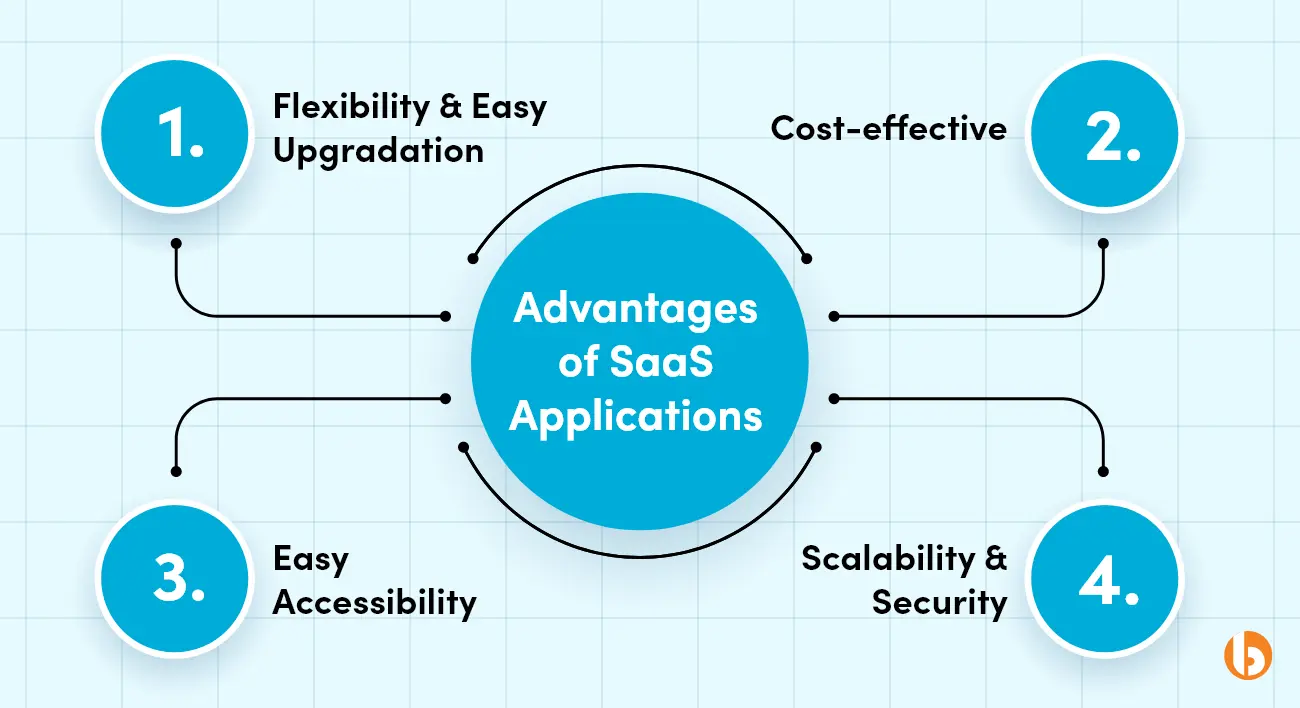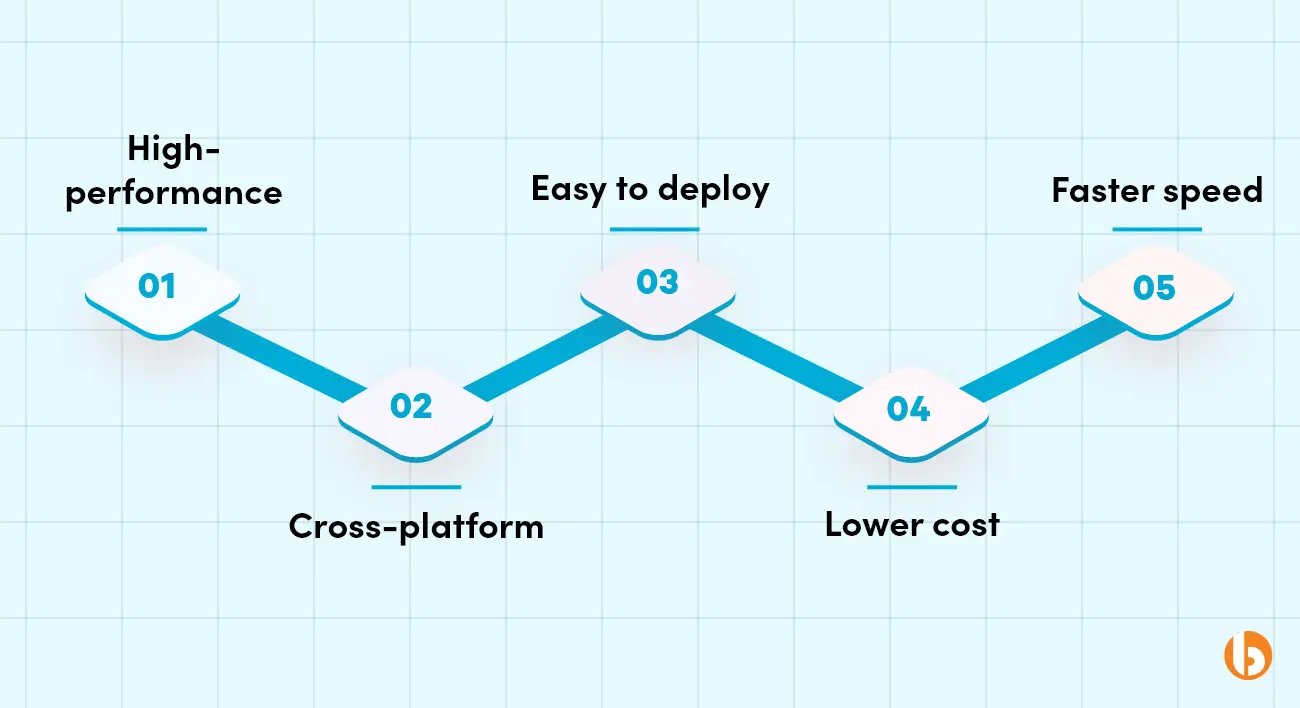Unlock the Power of SaaS Applications With Golang
Last Updated on April 10, 2025
Quick Summary:
Building a SaaS application is increasingly popular because of its scalability, flexibility, and cost-effectiveness. Golang is an outstanding programming language for SaaS apps, and integrating it can create high-performance processing, secure and reliable applications. Let’s find out more about SaaS applications with Golang in this blog.
SaaS, which stands for Software as a Service, is the emerging future of applications. It has surged over the years and will likely be in more demand in the upcoming years. According to Statista, the global market of is expected to grow by $191 billion in 2025.
Popular SaaS applications like Slack, Salesforce, and Dropbox dominate the market. However, you require a robust programming language like Golang to build dynamic, stand-out SaaS applications.
Go is an open-source, high-level, and statically typed programming language designed by Google. Let’s find out more about it in this comprehensive blog.
In this guide, we will cover the importance of SaaS apps, why select SaaS Golang, how to build SaaS applications with Golang, and what the best practices are for Golang SaaS.
What’s one thing a business owner is looking for in an application? They want an app with multiple features and a seamless user experience. SaaS is a perfect solution for it. And let us break the myth that it is expensive to build a SaaS application.
It is cost-effective and offers numerous benefits. Let’s find out more reasons why startups should leverage SaaS for their business:
SaaS applications have revolutionized how businesses operate, making it easier for companies to utilize powerful software applications and tools without investing in expensive infrastructure.
Modern SaaS applications have enhanced functionality with advanced features and cutting-edge technologies, including automation, artificial intelligence, and machine learning. Multiple tools help businesses streamline their operations, improve customer service, and obtain insight into business metrics, which can help them make more informed decisions.
Let’s dive deep into the advantages of using SaaS applications.
Ready to build a high-performance SaaS application with Golang?
Don’t settle for anything less. Hire a dedicated Golang developer and embark on a journey towards success!
Due to numerous benefits, software as a service has become immensely popular in the past few years. Here are the four advantages of SaaS applications:

SaaS applications are often updated with the latest version, features, and functionalities. The updates are automatically installed, which makes it easy for developers. Additionally, flexible applications can easily be customized to match business requirements.
The Saas-based application is cost-effective because it requires no investment in other hardware. The software eliminates the upfront costs for installation and purchases. Also, it can be easily downloadable and waste no resources on unused licenses. The maintenance costs are low compared to the traditional model.
One of the most significant advantages of SaaS is that it is accessible from anywhere with an internet connection. It makes it manageable for the users to access from different locations and devices. Also, it can change their usage plan without further notice.
The software applications are highly scalable and can be scaled up according to requirements. You also don’t have to purchase another server. Additionally, SaaS offers robust security measures, such as powerful backups, data encryption, and access controls.
Golang and SaaS are comparatively new approaches to application development services, which has become a leading trend. With SaaS Golang, you can develop applications with modern architecture and fewer errors. Exploring the benefits of Golang can provide deeper insights into why this combination is so effective.
Let’s look at the top reasons you should consider Golang SaaS applications:

Golang provides high performance and speed, making it ideal for SaaS applications. Also, it helps the application manage many requests and traffic.
Most SaaS applications run multiple industries, and here Golang can play a significant role as it provides a development platform. It is helpful for multiple businesses, and Golang supports platforms such as Windows, Linux, and macOS.
It is a suitable match because applications using Golang can easily be deployed and run as they have a small footprint. Also, it is deployed to cloud-based environments, such as Google Cloud Platform and Amazon Web Services.
Golang is known for its faster speed, and SaaS applications need rapid development with faster response time. Thus, Go is ideal for SaaS applications as it develops an application with less loading time.
Golang is known for faster speed, and SaaS applications need rapid development with faster response time. Thus, it makes Go ideal for SaaS applications as it develops an application with less loading time.
Building SaaS applications with Golang can be challenging and daunting, but when you have the right tools and a skilled team, the results speak for themselves. To ensure the success of your project, hire SaaS developers who are proficient in Golang.
There are different types of SaaS applications. So, before using Golang to create SaaS applications, the first and most essential step is to determine which type of SaaS application you want for your project.
As a result, you will be able to define features and functionalities for your cloud-based software. Also, it helps to determine the target audience and pricing strategy. It is conducted through planning, research, and analyzing the market.
Once you clearly understand what type of SaaS applications you want to opt for, it is time to set a clear direction for the development process with Golang.
After you define the types of applications, the next step is to determine the technology and stack required to build the software application. Here, Golang comes into the picture. The backend framework is an excellent choice because of its concurrency, speed, and extensive ecosystem of libraries and packages.
To build SaaS apps in Go, developers often turn to some popular Golang frameworks,
including Gin, Revel, and Echo, for their robust capabilities. Also, the framework provides middleware, routing, and error-handling capabilities, which makes development rapid and efficient.
There are two tenancy models, single and multi-tenant, for building software applications. Golang Multi-Tenant architecture enables applications to handle multiple tenants using a shared database, which can streamline development and maintenance.
The database schema defines the data structure stored in the database. A well-designed database schema can improve the performance, reliability, and scalability. The scheme defines the table, columns, and storing and receiving data relationships.
Thus, it is vital to determine the database schema and system design while building SaaS applications with Golang. The most popular choice of database management system is Postgre SQL. Also, you can use MongoDB and MySQL to build reliable and secure SaaS applications.
You can also use Amazon Web Services in Golang to build cloud-based architecture. Ensure that your chosen database schema handles the increasing demand for extensive data without compromising performance.
Back-end development is one of the most crucial steps in building a SaaS application. Golang is the best choice for building the application’s server side. The back end manages the application’s core functionality, such as business logic, data management, and authentication.
It communicates with the front end and the database, allowing users to interact with the application through APIs.
While setting up the application with Golang, several packages, such as standard net and HTTP, streamline the development process. Also, it helps to handle the request, provide faster routers and build robust applications. In addition, it helps to secure your SaaS application with its components.
After finishing the back-end development, the next step is integrating Go with other front-end frameworks. The front end delivers an intuitive and seamless user experience, while the back end fetches and interacts with data.
You can choose a front-end framework like Angular, React, and Vue.js to integrate with Golang. You can use WebSockets or REST APIs. The REST APIs support functionality of the back end through a well-defined set of URLs and HTTP methods.
WebSockets allow real-time communication between clients and servers. It helps to make SaaS applications more interactive and approachable, as multiple SaaS platforms are chat systems.
However, integrating Golang with front-end frameworks ensures optimizing APIs, so it is faster loading time and reduces the data transfer threat in software applications. The front-end framework should be user-friendly and accessible.
After executing your SaaS application’s back end and front end, the next step is running the development test. The initial development phase involves implementing back-end and front-end features, testing, and refining them until they match the requirement.
During the development phase, the practice has been writing clean, maintainable code, using version control systems like Git, and documenting your code. However, ensure while testing, you identify and fix all the bugs.
In Golang, you can use tools like Go Mod, GoLint, and Go Vet. It helps to ensure code quality, dependency management, and security. Continuous integration and deployment (CI/CD) pipelines also automate development and testing.
The last step of building a SaaS application using Golang is to monitor applications. Monitoring and maintaining it is vital to ensure it performs well and matches the project requirements.
Monitoring your software applications involves analyzing and collecting metrics that include response times, resource utilization, and reduced error rates. In Golang, you can use tools like Grafana and Prometheus to monitor metrics and solve potential issues by identifying them early.
Later, you must ensure that tasks perform well and smoothly with maintenance. You must include database backups, code updates, and fixing bugs to secure SaaS applications. Additionally, regularly review and optimize your application architecture and infrastructure.
You can use tools like Sentry to track and issue application errors to assist with maintenance and monitoring tasks.
Don’t let your SaaS application fall short in a fast-paced market
Choose our Golang development services and build software that empowers your users and drives your business forward!
Follow this best practices to ensure that your SaaS applications with Golang are signficant:
Building SaaS applications with Golang is an excellent choice as it provides reliable, scalable, and fast applications. SaaS apps are the new revolution, and by leveraging the power of Golang, you can develop high-performance, superior user experience applications that match your business needs.
If you are looking to build Golang SaaS applications but you don’t have expertise, you can contact a SaaS development company to build a dynamic SaaS application.
It will cost around $10,000 to $100,000 to build a SaaS application using Golang. However, it may vary depending on the requirements.
Golang is ideal for SaaS applications because it is a powerful programming language well-suited with fast runtime performance, built-in concurrency, and strong type safety.
A SaaS boilerplate is a pre-built template that provides a starting point for developing a SaaS app. With a boilerplate, you can speed up development time and ensure best practices are followed. However, it needs to be customized as per the business requirements.
Stripe, Bitly, and Monzo Plus are popular SaaS applications that have used Golang.
Yes, there will be a few challenges while building the SaaS application using Golang, such as limited third-party libraries, garbage collection, and a learning curve. However, with the help of a skilled developer, you can create a dynamic SaaS application.
Your Success Is Guaranteed !
We accelerate the release of digital product and guaranteed their success
We Use Slack, Jira & GitHub for Accurate Deployment and Effective Communication.